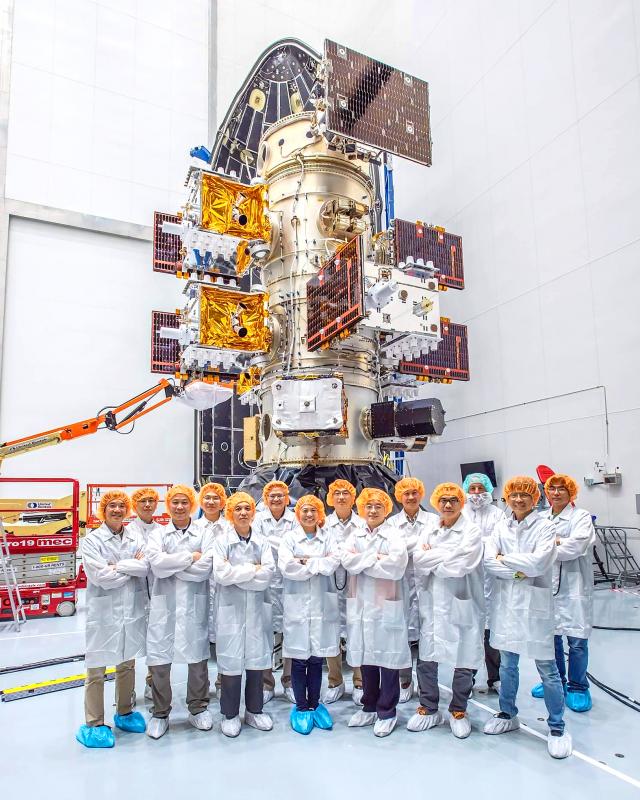The Executive Yuan yesterday passed a draft space development bill, which would provide a legislative basis for space-faring rocket launch sites and regulations for Taiwanese actions in space, marking the nation’s intent to boost space-related industries.
Executive Yuan Secretary-General Li Meng-yen (李孟諺) made the announcement at a news conference after a regular Cabinet meeting, at which the Ministry of Science and Technology (MOST), which oversees the National Space Organization, presented the draft bill.
Premier Su Tseng-chang (蘇貞昌) had approved the third phase of the national space project when he took office in 2019, Li said, adding that the space industry is among the “six core strategic industries” touted by President Tsai Ing-wen (蔡英文).

Photo courtesy of the National Space Organization
Tsai singled out the space industry at a national security event on Wednesday, stating that government investment in the sector is building a rudimentary backbone for the industry, especially in the fields of rocket launches and satellite construction, Li said.
Taiwan’s leading position in semiconductor manufacturing, as well as its advantage in information technology and precision machinery manufacturing, lend it an edge in the development of a space industry, Su said at the meeting.
That Taiwan could make advances into space is no longer a dream, but a viable reality, Su said.
The proposed law would enable specific organizations and companies to promote space-related businesses, in addition to NT$25 billion (US$882.46 million) set aside for the national space project.
The MOST, the Ministry of Economic Affairs, the Ministry of Transportation and Communications and the Ministry of National Defense should work together to develop the space industry sector so Taiwan would be capable of launching its own satellites into orbit, Su said.
The draft has detailed regulations on how launch sites are to be defined and what regulations they would have to abide by, as well as what fines and penalties companies would face for breaching the regulations.
The penalties and fines should adequately compensate for accidents that occur at such sites, the proposed law says.
Launch sites should be established with environmental protection and sustainable development principles in mind, and the bill has several clauses regarding launch site locations, including regulations for Aboriginal traditional land, the MOST said in a news release.
The government should seek private investment, and offer sufficient incentives to help companies collaborate with foreign nations and foster talent to build a healthy space industry, the bill says.
The nation is scheduled to launch a weather observation satellite named Triton next year, followed by the launch of the Formosat-8 constellation’s first satellite in 2023 and a second in 2024, as well as a low-orbit communications satellite named Beyond 5G in 2025, the MOST said.

‘TAIWAN-FRIENDLY’: The last time the Web site fact sheet removed the lines on the US not supporting Taiwanese independence was during the Biden administration in 2022 The US Department of State has removed a statement on its Web site that it does not support Taiwanese independence, among changes that the Taiwanese government praised yesterday as supporting Taiwan. The Taiwan-US relations fact sheet, produced by the department’s Bureau of East Asian and Pacific Affairs, previously stated that the US opposes “any unilateral changes to the status quo from either side; we do not support Taiwan independence; and we expect cross-strait differences to be resolved by peaceful means.” In the updated version published on Thursday, the line stating that the US does not support Taiwanese independence had been removed. The updated

‘CORRECT IDENTIFICATION’: Beginning in May, Taiwanese married to Japanese can register their home country as Taiwan in their spouse’s family record, ‘Nikkei Asia’ said The government yesterday thanked Japan for revising rules that would allow Taiwanese nationals married to Japanese citizens to list their home country as “Taiwan” in the official family record database. At present, Taiwanese have to select “China.” Minister of Foreign Affairs Lin Chia-lung (林佳龍) said the new rule, set to be implemented in May, would now “correctly” identify Taiwanese in Japan and help protect their rights, the Ministry of Foreign Affairs said in a statement. The statement was released after Nikkei Asia reported the new policy earlier yesterday. The name and nationality of a non-Japanese person marrying a Japanese national is added to the

AT RISK: The council reiterated that people should seriously consider the necessity of visiting China, after Beijing passed 22 guidelines to punish ‘die-hard’ separatists The Mainland Affairs Council (MAC) has since Jan. 1 last year received 65 petitions regarding Taiwanese who were interrogated or detained in China, MAC Minister Chiu Chui-cheng (邱垂正) said yesterday. Fifty-two either went missing or had their personal freedoms restricted, with some put in criminal detention, while 13 were interrogated and temporarily detained, he said in a radio interview. On June 21 last year, China announced 22 guidelines to punish “die-hard Taiwanese independence separatists,” allowing Chinese courts to try people in absentia. The guidelines are uncivilized and inhumane, allowing Beijing to seize assets and issue the death penalty, with no regard for potential

‘UNITED FRONT’ FRONTS: Barring contact with Huaqiao and Jinan universities is needed to stop China targeting Taiwanese students, the education minister said Taiwan has blacklisted two Chinese universities from conducting academic exchange programs in the nation after reports that the institutes are arms of Beijing’s United Front Work Department, Minister of Education Cheng Ying-yao (鄭英耀) said in an exclusive interview with the Chinese-language Liberty Times (the Taipei Times’ sister paper) published yesterday. China’s Huaqiao University in Xiamen and Quanzhou, as well as Jinan University in Guangzhou, which have 600 and 1,500 Taiwanese on their rolls respectively, are under direct control of the Chinese government’s political warfare branch, Cheng said, citing reports by national security officials. A comprehensive ban on Taiwanese institutions collaborating or